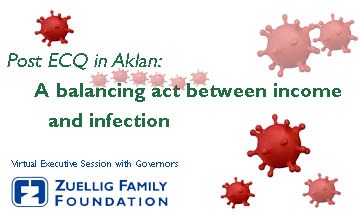Post ECQ in Aklan: A balancing act between income and infection
Features | by ZFF Admin

When the Philippines recorded its first COVID-19 case in January, Aklan was regarded as one of the hotspots because it had direct flights from Wuhan, China and tourists continued to flock to Boracay. But the provincial government’s quick actions proved effective in containing the virus. In fact, as of April 24, the province only had six confirmed COVID-19 cases, four of which have since recovered, and zero COVID-19 death.
During the recent executive session for governors facilitated by the Zuellig Family Foundation, UP COVID-19 Response Team member Dr. Jomar Rabajante said Aklan is still in the preventive stage, which means there is no COVID-19 outbreak in the province.
What worked in Aklan was its immediate response. It enforced border and port controls, and the closure of the international airport. It intensified its information campaigns across media platforms. It activated the municipal health officer-led Barangay Health Emergency Response Team for monitoring of identified or suspected cases. A mobile app was developed for COVID-19 hotlines, pharmacies, and food deliveries. Sanitation tents were set up in hospital entrances.
Aklan Governor Florencio Miraflores acknowledges that they have been “lucky” not to have local transmissions until now. But he also admitted the pressure to restart the tourism industry is great considering it is a major source of income where funds for the healthcare system also come from.
Enhanced community quarantine could be lifted soon in Aklan.
Still, prepare for the worst
Rabajante, however, reminded Aklan to still prepare for the worst scenario given the province’s lack of facilities to accommodate many cases should an outbreak occur. At present, Aklan only has a maximum capacity of 178 community quarantine beds, 31 hospital beds, 9 intensive care unit (ICU) beds, and 4 mechanical ventilators.
The province has not yet crafted a comprehensive plan for the reopening of the province that is why Miraflores is cautious. He knows “the chances of an outbreak is still there considering that Aklan is a tourist destination.” Thus, their next challenge is making sure there will be no widespread infection after COVID-19 related restrictions are removed.
ZFF Deputy Executive Director Dr. Anthony Faraon recommended taking this time for the provincial government to consult with all municipal mayors while they are still at the preventive stage. To further strengthen their preventive measures, Faraon suggested mobilizing a province-wide contact tracing team, focusing on the hotspot municipalities, strengthening community-based management, and finding continuous supplies of personal protective equipment (PPE) sets for community health workers.
Communicate well the risks, test more, protect health workers
ZFF Trustee Dr. Manuel Dayrit said the LGU should strengthen its risk communication strategies so every Aklanon knows the risks of getting and spreading the virus. And instead of buying, Dayrit also encouraged the making of face masks by ordinary citizens.
He said the province should identify the places where exponential growth could occur and build testing facilities near tourist areas so faster detection and isolation of probable COVID-19 patients are possible. “Outbreak potential increases with delay,” Dayrit added.
On the use of Bayanihan funds, Dayrit suggested prioritizing the purchase of PPE for healthcare workers. He also urged Aklan to fill the gaps in its healthcare systems particularly on the number of facilities in order to remain on top of the situation.
Routine activities to keep COVID-19 at bay
According Dayrit, COVID-19 will stay as long as no vaccine is discovered. Hence, another crucial move for Aklan is to establish barangay-to-regional routine activities to effectively monitor probable infection in communities, and activities in hospitals and quarantine facilities. He recommended creating a provincial command group that will be in touch with all levels of the LGU and ensure non-COVID needs are also taken into account.
Department of Health-Center for Health Development in Western Visayas director Dr. Marlyn Convocar said the testing capacity in the region is limited especially since it also caters to Region IV-B; hence, the delay in results. She suggested tapping private groups to increase Aklan’s laboratory testing capacities.
She also recommended clustering of influenza cases while gradually lifting community quarantine. She added that stringent measures be in place to limit and check the arrival of tourists and repatriates, impose strict healthcare measures in the workplace and schools, and continue surveillance in the community even after the lifting of community quarantine.
Miraflores thanked Dayrit for essentially spelling out the steps they have to take, and Convocar for the added inputs to what and how they should proceed post-ECQ. The challenge is to strike a balance between livelihood and public health.
The executive session, held last April 25, is part of ZFF’s efforts to assist its partner provinces in responding to the threats of COVID-19.